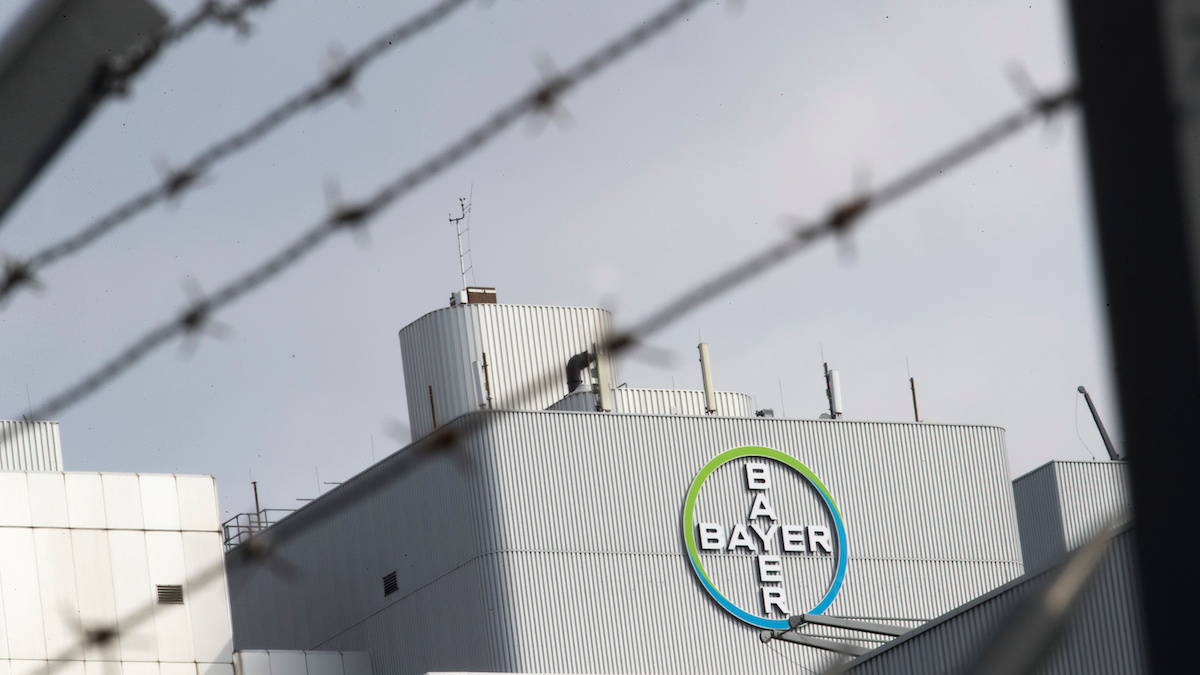
Monsanto Roundup Cancer Trial Postponed in St. Louis, Bayer Stock Climbs

The compound of German chemicals and pharmaceuticals giant Bayer in Berlin on March 20, 2019. ODD ANDERSEN / AFP via Getty Images
By Carey Gillam
A highly anticipated Roundup cancer trial set to start later this month in the St. Louis area has been pulled from the docket, a court official said on Wednesday.
The trial, which was to pit a woman named Sharlean Gordon against Roundup maker Monsanto Co., was to start Jan. 27 in St. Louis County and was to be broadcast to the public. Notably, Gordon’s lawyers planned to put former Monsanto CEO Hugh Grant on the stand. St. Louis was the home of Monsanto’s corporate headquarters until the company was purchased by Bayer AG of Germany in June of 2018.
In taking the trial off the calendar, the judge in the case has ordered that a status conference be set for a month from now, said St. Louis County Court spokeswoman Christine Bertelson.
The Gordon trial was already postponed once – it originally was scheduled for August. It is one of several trials that have been postponed in the last several months as Bayer attempts to find a settlement to the mass of claims filed against Monsanto by people stricken with non-Hodgkin lymphoma they claim was caused by exposure to Monsanto Roundup and other glyphosate-based herbicides. Bayer officials have said that Monsanto is facing more than 42,700 plaintiffs in the U.S.
Gordon developed non-Hodgkin lymphoma after using Roundup herbicides for 25 years at her residence in South Pekin, Illinois, and has suffered extensive debilitation due to her disease. Gordon’s stepfather, who also used Roundup at the family home, died of cancer. The case is actually derived from a larger case filed in July 2017 on behalf of more than 75 plaintiffs. Gordon was to be the first of that group to go to trial.
Monsanto and Bayer have denied that Monsanto’s herbicides can cause cancer, and assert the litigation is without merit but is being fueled by greedy plaintiffs’ attorneys.
According to sources close to the litigation, discussions are underway to postpone more Roundup cancer trials, possibly including one set to start Jan. 21 in St. Louis City Court. Attorneys for Monsanto and for the plaintiffs in the upcoming January trials declined to comment.
Shares in Bayer hit a 52-week high and were up close to 3 percent Wednesday. Investors have been pushing the company to find a way to avoid future trials and to settle the litigation.
In the three Roundup cancer trials held so far, unanimous juries have found that exposure to Monsanto’s herbicides does cause non-Hodgkin lymphoma and that the company covered up the risks and failed to warn consumers. The three juries awarded a total of four plaintiffs more than billion in damages, but the trial judges in each case have reduced the awards significantly.
No damages have yet been paid as Monsanto appeals the verdicts.
Bayer’s annual shareholders’ meeting is set for April 28 and analysts said investors would like to see either a settlement of the litigation by that time, or at least meaningful progress in containing the liability. Bayer’s stock took a dive, losing billions of dollars in value, after the first jury verdict in August 2018, and share prices remain depressed.
Reposted with permission from U.S. Right to Know.
- Monsanto Cancer Ruling Sparks Backlash Around the Globe ...
- Glyphosate Spin Check: Tracking Claims About the Most Widely ...
- More Monsanto Roundup Cancer Trials Expected to Be Postponed ...
- Former Monsanto CEO Ordered to Testify at Roundup Cancer Trial ...

 233k
233k  41k
41k  Subscribe
Subscribe 